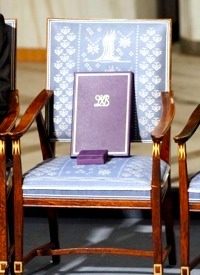
Chinese dissident Liu Xiaobo may not have the name familiarity in the West of a man such as Barack Hussein Obama, but as of today the two men now share at least one thing in common: The Norwegian Nobel Committee has awarded them its famous Peace Prize.
After last year’s fumble, awarding the Peace Prize to a man lacking any notable accomplishments in the cause of world peace, the Nobel Committee appears to be returning to a practice of awarding actual achievements, rather than muddled sentiments. In fact, when the committee awarded President Obama with the prize last year, Liu Xiaobo was already imprisoned in China on suspicion of “inciting subversion of state power.” As Reuters reported at the time of Liu’s arrest in June 2009:
One of China’s best known dissidents, Liu Xiaobo, has been formally arrested on suspicion of inciting subversion, following his detention late last year for promoting a petition calling for an end to one-party rule.
The move brings one of the most prominent critics of the ruling Communist Party a step closer to trial, and it will be a blow to supporters and human rights groups who had hoped he would be released after China passed the politically sensitive 20th anniversary of the 1989 pro-democracy Tiananmen protests.
State news agency Xinhua said on Wednesday prosecutors approved Liu’s arrest by Beijing police on Tuesday for “alleged agitation activities aimed at subversion of government and overthrowing of the socialist system.”
“Liu has been engaged in agitation activities, such as spreading of rumours and defaming of the government, aimed at subversion of the state and overthrowing the socialism system in recent years,” Xinhua quoted police as saying in a statement.
Liu has the distinction of being the fourth person awarded the Nobel Peace Prize while in prison, thus joining the ranks of Carl von Ossietzky (1935), Andrei Sakharov (1975) and Aung San Suu Kyi (1991), who were imprisoned by socialist tyrants in Nazi Germany, the Soviet Union, and the military junta of Burma/Myanmar, respectively. Liu is the first Peace Prize recipient since von Ossietzky to be denied a personal representative to receive the prize on his behalf. What remains to be seen is whether an apathetic West will recognize that there is a kindred spirit between regimes which so cruelly repress their people; socialist regimes — whether of the national or international variety — are characterized by a systematic suppression of the human spirit and the denial of basic liberties.
In a press release summarizing the reasoning behind its decision to award Liu the 2010 prize, the Nobel Committee summarized his efforts since Tiananmen Square on behalf of the cause of freedom in the People’s Republic of China:
For over two decades, Liu Xiaobo has been a strong spokesman for the application of fundamental human rights also in China. He took part in the Tiananmen protests in 1989; he was a leading author behind Charter 08, the manifesto of such rights in China which was published on the 60th anniversary of the United Nations’ Universal Declaration of Human Rights, the 10th of December 2008. The following year, Liu was sentenced to eleven years in prison and two years’ deprivation of political rights for “inciting subversion of state power”. Liu has consistently maintained that the sentence violates both China’s own constitution and fundamental human rights.
The campaign to establish universal human rights also in China is being waged by many Chinese, both in China itself and abroad. Through the severe punishment meted out to him, Liu has become the foremost symbol of this wide-ranging struggle for human rights in China.
As Americans rush to the malls this Christmas season, perhaps they would do well to consider whether the gifts which they choose for loved ones are ultimately serving the best interests of their recipients — and the best interests of those who manufactured them. While dissidents such as Liu rot in prison, inexpensive Chinese products flood the American market, carrying the wealth of an economically troubled nation off to benefit a regime that treats one of its bravest citizens of their nation with manifest contempt, and that holds hundreds of millions under the bondage imposed by political ideology that allows no dissent.
Photo of Nobel Peace Prize medal and diploma on an empty chair representing Nobel Peace Prize laureate Liu Xiaobo: AP Images



